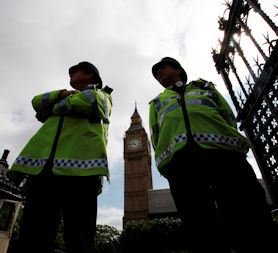Police cuts will lead to ‘widespread disorder’
A police chief warns that the police service must be kept strong to cope with rising social and industrial tensions as the coalition government carries out its austerity policies and spending cuts.

Chief Superintendent Derek Barnett, who will make the warning in a speech at the Police Superintendents’ Association conference this week, is urging the Home Secretary Theresa May to get it right first time as she oversees the most radical reforms in policing in half a century.
With government spending cuts due of 25 per cent, it is feared as many as 40,000 officers’ jobs could be axed, as the government tries to plug its budget deficit.
Tomorrow in his speech, Mr Barnett will ask Mrs May to ensure that officers feel “valued, treated fairly with respect and dignity and that their pay and conditions of service reflect those dangers and the uniqueness of the role they perform.”
He will say that it is the police who will have to respond to “widespread disorder on our streets” as deep cuts are made across the public sector.
He will say: “We must be sufficiently resilient to enable us to respond properly, professionally and safely with the minimum of force.
“It will not be PCSOs, or special constables, or non-warranted police staff, journalists or politicians to restore order on our streets. It will be our police officers.”
Mr Barnett, president of the Police Superintendents’ Association of England and Wales, will add: “In an environment of cuts across the wider public sector, we face a period where disaffection, social and industrial tensions may well rise.
“We will require a strong, confident, properly trained and equipped police service, one in which morale is high and one that believes it is valued by the government and public.”
Speaking at the association’s annual conference in Cheshire tomorrow, he will claim it is “a fundamental duty of government to ensure the security of the nation”, and that whatever resources the superintendents are given they will work to combat such criminal activities as terrorism, major incidents and large scale public disorder.
‘Do More with less’
In a plea to the Home Secretary not to sharpen the axe when deciding on police cuts, Mr Barnett will say that as numbers are cut, superintendents are “being asked to do more with less“, meaning that “the already long hours culture will get worse and health and family responsibilities will suffer”.
On reforming the police service, Mr Barnett admits there will be difficulties ahead, but he says “it also presents opportunities and we will embrace them enthusiastically”.
Such changes include the introduction of locally-elected police and crime commissioners. He will say the “history of policing will judge us harshly if we do not seize the opportunity we have now.”
“We must be sufficiently resilient to enable us to respond properly, professionally and safely with the minimum of force.” Derek Barnett
Acknowledging the force needs to adapt to the current financial situation, he will admit the need to cut bureaucracy, too many inefficiencies and too many senior officers chasing targets “when they should be making sure we are chasing criminals.”
Despite his admission of inadequacies in the current system, Mr Barnett will argue that the police have not lost touch with the public.
Among other issues he will also support proposals for so-called virtual courts, claiming they will “save time and money, improve efficiency and make justice more immediate” and will back plans to give credit to offenders who make an early admission of guilt.
Finally he will also outline officers’ concerns over the new police and crime commissioners, future penal policy and an unwillingness “to consider radical restructuring of the service.”